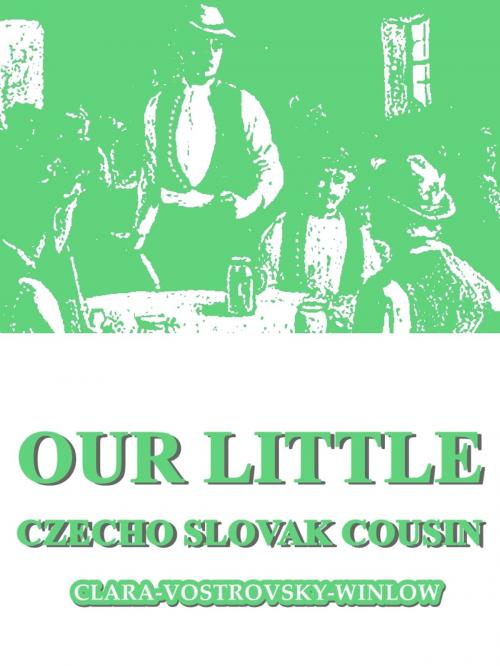Our Little Czecho Slovak Cousin
Kids, Natural World, Ecosystems, Environment, Nonfiction, History, European General| Author: | Clara Vostrovsky Winlow | ISBN: | 1230000261964 |
| Publisher: | The Page Company | Publication: | August 21, 2014 |
| Imprint: | Language: | English |
| Author: | Clara Vostrovsky Winlow |
| ISBN: | 1230000261964 |
| Publisher: | The Page Company |
| Publication: | August 21, 2014 |
| Imprint: | |
| Language: | English |
Example in this ebook
The gallant exploits of the Czecho-Slovak army in Siberia won the attention and sympathy of the world to and for their hopes and sacrifices in the cause of freedom. Fighting the Germanic Powers was not a new thing to them. Bohemia, the chief of the Czecho-Slovak states, has always been the battlefield between Slav and Teuton. All that of which Bohemia is proud to-day was won inch by inch through incessant struggle, through bringing to bear every force of civilization possible, on the German rulers. Bohemia's leaders emphasized the need of education; and so effectually, that Bohemia, to-day, ranks as one of the most literate states of Europe. They emphasized idealism, that not by brute force but by being better fit should they eventually win. They kept alive their faith in a renewal of Bohemia's wonderful, romantic history, that the people might not sink into despair from dwelling on what their proud spirits held to be the degradation of their position. They urged the development of economic strength, and Bohemia to-day is self-sustaining. Through ceaseless battling for their rights, through pride in their great accomplishment in the face of great obstruction, the Czechs held their heads as high as the inhabitants of independent lands. It is an interesting fact that every poet, every musician, every artist felt it his duty to devote his art to his native land.
And here it might be well to state that the Czech of Bohemia, although often called Bohemian, has absolutely nothing in common with the Bohemian meaning gypsy. This term was once applied to some gypsies in France, through a misapprehension that they came from Bohemia. It clung even after the error was corrected. These particular gypsies really came from Hungary, which however does not mean that Hungarians or Magyars and gypsies are one and the same. The gypsies, like the Jews, do not belong to any one country.
Besides Bohemia, the Czecho-Slovak states comprise Moravia, a rich farming country, the birthplace of the great educator, John Amos Comenius; a part of Silesia, famous for its mines; and Slovakia, also rich in mineral wealth which is largely undeveloped. Of these, Slovakia suffered perhaps the most under the scorn, oppression, and exploitation of the Magyar oligarchy. Taxes in all the states were high. Bohemia, especially, because of its wealth, not only paid for itself, but helped support unproductive Austrian German lands. The language in all of these states is so closely allied that the citizen of one can easily understand the citizens of any of the others.
It is thought by some that Czecho-Slovakia will be a small country. This is not exactly true, for it will rank eighth in size among all the European states.
One thing that the Czecho-Slovaks have particularly shown during the War, and which argues well for their future, is their capacity for self-government. Not only did they show splendid organization in their efforts to secure recognition, but when the time came to proclaim the Republic, it was found that their machinery was in perfect working order; and, although great reforms have been inaugurated, so far things have progressed with a smoothness not to be found in any of the other newly-formed states.
To be continue in this ebook................................................................................................................
Example in this ebook
The gallant exploits of the Czecho-Slovak army in Siberia won the attention and sympathy of the world to and for their hopes and sacrifices in the cause of freedom. Fighting the Germanic Powers was not a new thing to them. Bohemia, the chief of the Czecho-Slovak states, has always been the battlefield between Slav and Teuton. All that of which Bohemia is proud to-day was won inch by inch through incessant struggle, through bringing to bear every force of civilization possible, on the German rulers. Bohemia's leaders emphasized the need of education; and so effectually, that Bohemia, to-day, ranks as one of the most literate states of Europe. They emphasized idealism, that not by brute force but by being better fit should they eventually win. They kept alive their faith in a renewal of Bohemia's wonderful, romantic history, that the people might not sink into despair from dwelling on what their proud spirits held to be the degradation of their position. They urged the development of economic strength, and Bohemia to-day is self-sustaining. Through ceaseless battling for their rights, through pride in their great accomplishment in the face of great obstruction, the Czechs held their heads as high as the inhabitants of independent lands. It is an interesting fact that every poet, every musician, every artist felt it his duty to devote his art to his native land.
And here it might be well to state that the Czech of Bohemia, although often called Bohemian, has absolutely nothing in common with the Bohemian meaning gypsy. This term was once applied to some gypsies in France, through a misapprehension that they came from Bohemia. It clung even after the error was corrected. These particular gypsies really came from Hungary, which however does not mean that Hungarians or Magyars and gypsies are one and the same. The gypsies, like the Jews, do not belong to any one country.
Besides Bohemia, the Czecho-Slovak states comprise Moravia, a rich farming country, the birthplace of the great educator, John Amos Comenius; a part of Silesia, famous for its mines; and Slovakia, also rich in mineral wealth which is largely undeveloped. Of these, Slovakia suffered perhaps the most under the scorn, oppression, and exploitation of the Magyar oligarchy. Taxes in all the states were high. Bohemia, especially, because of its wealth, not only paid for itself, but helped support unproductive Austrian German lands. The language in all of these states is so closely allied that the citizen of one can easily understand the citizens of any of the others.
It is thought by some that Czecho-Slovakia will be a small country. This is not exactly true, for it will rank eighth in size among all the European states.
One thing that the Czecho-Slovaks have particularly shown during the War, and which argues well for their future, is their capacity for self-government. Not only did they show splendid organization in their efforts to secure recognition, but when the time came to proclaim the Republic, it was found that their machinery was in perfect working order; and, although great reforms have been inaugurated, so far things have progressed with a smoothness not to be found in any of the other newly-formed states.
To be continue in this ebook................................................................................................................















